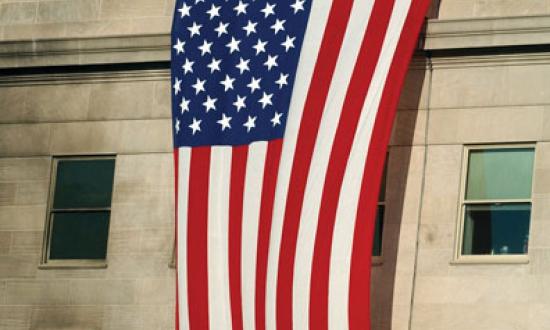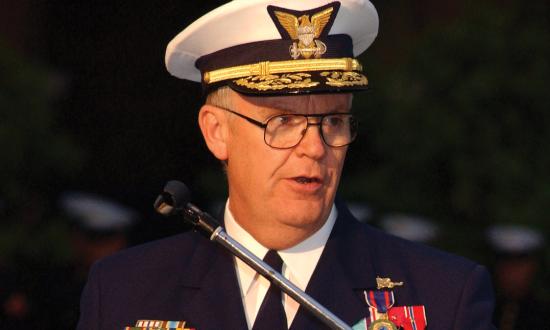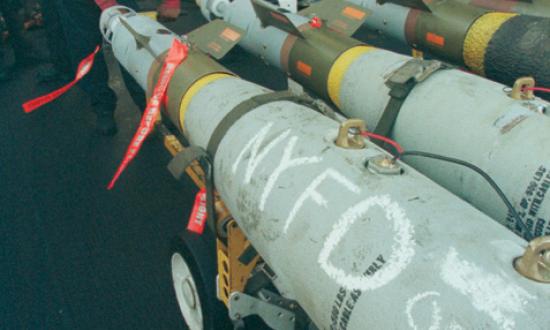I walked into my math class at 9:50 after having talked to my mom on the phone about sending me a new pair of shoes, because the soles were flapping on my old pair. There was a little bit of energy in the air, an unusual current for my midmorning math class. The news traveled from the far corner to where I was seated by the door: A plane had crashed into the World Trade Center. The picture that formed in my head was a Cessna with a “student pilot” sign on the back of the plane, some untrained pilot who lost control.
This plebe was in a math class; another was in line at the barber shop; another on watch in Bancroft. The plebes in my English class were scattered all over the Yard when they heard the news on 11 September 2001. They quickly learned that a student pilot had not, in fact, crashed into the Twin Towers.
Before that September morning, the Naval Academy Class of 2005 was like most plebe classes. Plebe summer acne had faded; their shorn locks were growing back. They were no longer sweating in their whites. The semester had been underway for almost a month, so they were oriented to the academic year.
Then, suddenly, they were no longer ordinary. That day blasted them into a riot of questions: Was the Academy the next target? What was the safest place for the mids? Would their education be curtailed?
No sooner had the questions been asked than the Academy went to Force Protection Condition Delta and Marines with M16s and M60s were stationed on roofs. Then another question surfaced, not from the plebes, but from other sectors of the Academy: Might the plebes start leaving in droves? They hadn’t signed up for desert duty. Most of them had never given Osama bin Laden a second thought. Some of them, in truth, had only come to play sports or to save their parents the cost of tuition. Not every plebe accepts a commission for patriotic reasons.
As the Academy sandbagged and blockaded and every isolated box and garbage bag became a threat, we hoped we would not lose too many members of the Class of 2005.
We needn’t have worried. Our way of life was under attack. They wanted to serve.
Weeks later, I assigned an essay asking the students to write about 11 September. They were writing for future generations who would have no idea about 11 September. Their purpose was to capture what it was like to be alive on that day.
Some students locked on to specific objects: a watch, a book, a bookbag.
I immediately looked at my watch. I don’t know if this was just some sort of instinctual action or if I just knew that 8:48 AM would be that time that, in history, would make a morbid stamp on all humanity. . . . What I have not been able to get out of my mind are the thousands of clocks and watches that are stuck, frozen in time, and the mothers, fathers, sons, and daughters they belonged to. . . . I thought of the mother on American Airlines Flight #77 that was looking to see how long it had been since she fed her baby. Then I thought about the rugged and worn-out Casio that the maintenance man on the 117th floor was wearing. . . .
When I first received it from my uncle, the book seemed like just another graduation gift. Although it was leather-bound and very professional and had The Navy embossed on the cover, I never had time to look at it. This coffee-table book would make the September 11, 2001, tragedy personal for me. When I learned that my uncle’s office at the Pentagon was completely destroyed and we had no information about him, I didn’t know how to feel. Sadness, anger, and anxiety came over me all at once. These people had struck our country and I was mad. . . . Later I learned my uncle was on the other side of the Pentagon during the crash and was unhurt. I read that white book for the first time that night.
As I walked to my seat in the rear of the classroom, I noticed several books and a bag strewn chaotically over the floor by my chair. Turning to the classmate next to me, I asked if they were his belongings. My anger toward the terrorists swelled to fury as he told me the bag belonged to a shipmate whose father worked in the World Trade Center. . . . I imagined my shipmate dropping his bag and sprinting toward the nearest phone in search of relief from the nightmare that must have been developing in his head.
Even the wardrooms felt different as the students struggled to make sense of the attack.
The tiny wardroom was filled to the max, the old, ragged furniture looked as if it was going to break, and people were standing on chairs in the back just trying to get a glimpse of the TV. Even plebes were allowed in there that night, waiting to hear of any breaking news.
A full week after the attacks, I was passing through the wardroom, on my way to the refrigerator to get milk. As usual, CNN was grinding out more footage of funerals. I glanced up at the big-screen television, and the funeral was that of a USNA graduate. In that moment, the full scope of the grief felt by the nation struck me. I had never met this man. He had graduated a full decade before I would, yet I knew him as well as if he had been my brother. I knew that he chopped the same way I chopped. He had rolled his socks in the exact same way I did. He had sweated away countless hours of his life on Worden Field. He had done uniform and rack races. Someone who had been exactly what I was had died in a terrorist attack in New York City.
The overwhelming majority of these plebes expressed deep patriotism.
Having to wear the uniform even on liberty became an honor instead of a chore.
There have been many times that I have been proud to wear the uniform and be part of the United States Navy, but no such time topped that of September 11, 2001. . . . There has been no other time that I was more thankful to be in the military than on that day.
From the guy that stopped me on the street to talk about the honorable profession I chose, to the flag sticker on my football helmet, there were reminders of patriotism everywhere.
I was instantly ready to take up my position on the battlefield if summoned at that very moment. It was as if a family member had been attacked, as if my younger brother had been beat up, and I was eagerly seeking revenge.
Exactly 11 days after the attack, as the Brigade marched into the football stadium for a game against Boston College, the Boston College fans came into view. . . . Each fan was wearing patriotic colors on their clothing. Their cheers were not due to the fact that we were midshipmen. . . . Instead, they were supporting us because we had dedicated our lives to serving the country. . . . They entrusted us to ensure justice on the terrorist attacks.
Every year on the anniversary of 11 September, I read excerpts from these essays to my current classes. The words never grow old for me. I save for last one essay, in which the plebe writes of a childhood visit to Windows on the World, the restaurant at the top of the World Trade Center. He writes of a waiter who may or may not have survived.
Donning gray slacks, a miniature blue sports coat, and a clip-on tie, I took the express elevator with my parents to the top of the World Trade Center. The elevator doors opened, and I was confronted by a restaurant unlike any I’d ever seen: Windows on the World. The extravagant restaurant was not enclosed by walls but by windows, which allowed the patrons to view the entire city. As we waited for our table, my parents took the two last seats at the bar. A stocky bald man, who spoke with a soft Irish accent, came over to take our orders. With a sparkle in his eye, Tom immediately directed his attention to me. “Aren’t we looking spiffy tonight, lad,” he said as he leaned over the bar to speak with me. He came out from behind the bar and took me by the hand to the windows overlooking New York City. He walked me around the perimeter pointing out all the famous sights of the city. But when we reached the Statue of Liberty, Tom stopped. Lady Liberty, illuminated by white light, looked more majestic than anything I had ever seen. Tom told me the story about how when he left Ireland, as a boy not much older than myself, the Statue of Liberty was the first sight he saw upon entering America. I will never forget the words he spoke to me that night. He said “Lad, America is a special place; it is a place that welcomes the world’s orphans and gives them the opportunity to prosper.” The hostess came and notified us that our table was ready, and that was the last I saw of Tom.
The plebes turned in these essays on 5 October 2001. When I returned them, I gave each student a collated copy of all the essays, with a request that they keep the essays for at least 30 years.
Perhaps rereading their own words will help them remember: the quiet that descended on Bancroft Hall, the vigil in Tecumseh Court during which the bagpipes played “Amazing Grace,” or how their worried friends asked them, “Will you have to go to war?”
Maybe their own words will help them remember that which we will never forget.






